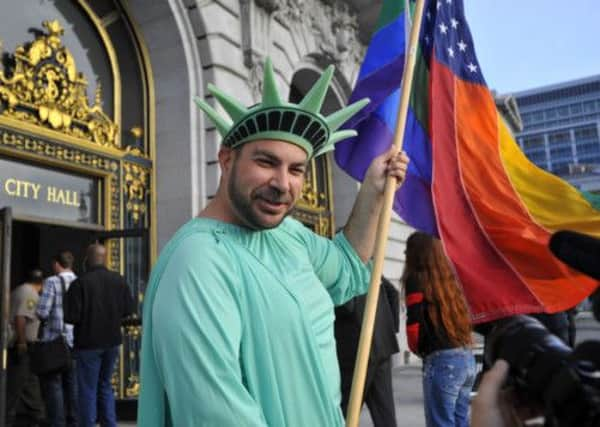Top US Court strikes down Defence of Marriage Act


America’s most powerful court ruled that a law, the Defence of Marriage Act or Doma – which denied government benefits to same-sex married couples and said that marriage should be between a man and a woman – was unconstitutional.
It also effectively overturned a ban on gay marriage in California – meaning that same-sex marriages can resume there.
Advertisement
Hide AdAdvertisement
Hide AdThe rulings made yesterday the most important day for gay rights in the US in a generation.
They open the door to challenges in the remaining 38 states that have banned gay marriage and will make it far more likely that they will be a success.
President Barack Obama said that the court’s decisions were a “historic step forward”.
He said: “This was discrimination enshrined in law. It treated loving, committed gay and lesbian couples as a separate and lesser class of people.
“The Supreme Court has righted that wrong, and our country is better off for it.”
Mr Obama said that the ruling applies only to civil marriages and that how religious institutions define and consecrate marriages has always been up to those institutions.
Among the celebrities who expressed their pleasure with the ruling was Star Trek actor George Takei, an outspoken gay rights campaigner, who wrote on his Facebook page: “Today marks a watershed moment in history and a tremendous victory for the principle of equality.”
Ben Affleck Tweeted: “Big news from the Supreme Court. Goodbye #DOMA #Prop8. Hello #equality.”
Advertisement
Hide AdAdvertisement
Hide AdGay rights campaigners cried and hugged outside the court and said that the decisions were on a par with Civil Rights era victories.
They also vowed to use them to overturn the remaining bans across the US.
The Supreme Court’s rulings were on Doma, which was signed into law in 1996 under then president Bill Clinton, who has subsequently called it unconstitutional.
By striking it down, the court has now allowed gay people access to more than 1,100 federal benefits and rights, including when their spouse dies.
The majority decision by justice Anthony Kennedy, supported by four liberal judges, read that Doma “violates basic due process and equal protection principles”.
The case was brought by Edith Windsor, 83, from New York, who was forced to pay a £236,000 inheritance tax bill when her partner of 42 years Thea Spyer died. If she had been in a heterosexual relationship, then she would have come under a federal estate tax deduction law.
After the Supreme Court ruled in her favour, Ms Windsor will now get a rebate.
The second case involved Proposition 8, which was a law passed in California banning gay marriage after it was legalised for five months in 2008.
Advertisement
Hide AdAdvertisement
Hide AdThe court ruling was more complicated and said that opponents had not had the right to appeal a lower court ruling that overturned the ban.
This effectively removes any legal obstacle to same-sex couples marrying in California.